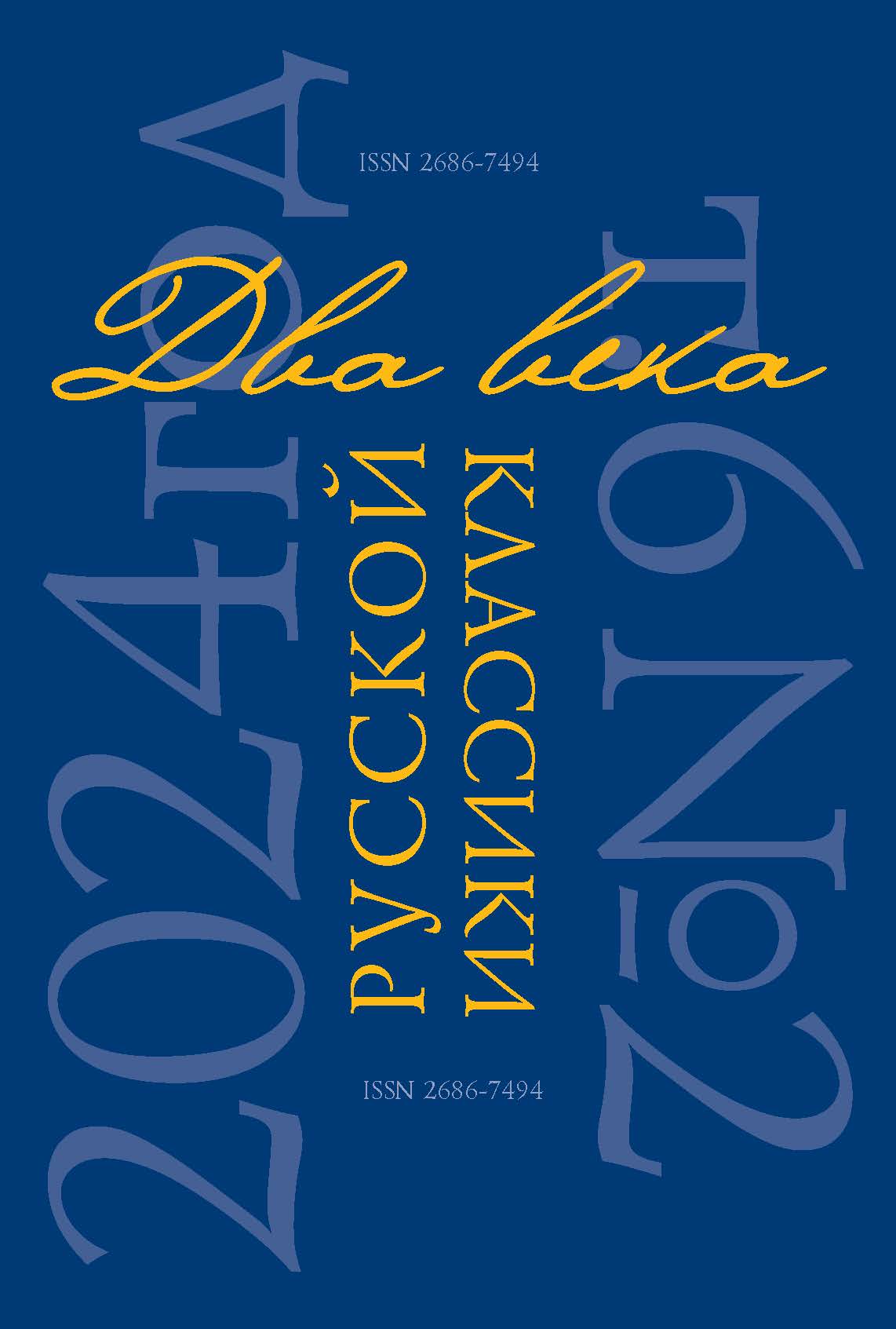The research is executed with financial support of the RFBR,
project No. 18-012-90043 “The analysis, interpretations and understanding as methodological installations in studying of heritage of Dostoyevsky”
Abstract: The formula 2x2=4 is considered to be the basic “scientific” truth till now. However, doubts about the immutability of this example already appeared in the XIX century. F. Dostoevsky, I. Turgenev, V. Odoevsky and others expressed these doubts. Possible origins of this formula in Russian literature are Catholic scholasticism (it has a rich tradition of proving the existence of God with the help of mathematical facts), German classical philosophy (it often bases idealism on rationalism), French materialism (instead, it denies religion with the help of mathematics).But these directions have had a contradictory impact on Russian classics, creating the theatres for polemics. The “two times two is four” becomes a symbol of rationality in Russian literature. The opposite to it is the formula “two times two is five”. It is a symbol of irrational perception of the world, Faith in God's Providence. The opposition of these formulas has deep roots in Russian culture and goes back to Gospel and the opposition of Law and Grace.
References
- “Ne veriu! Razgovor s ateistom” na telekanale “Spas” ["I don't believe! A conversation with an atheist" on the TV channel "Spas"]. Telekanal “Spas” URL: https:.m.youtube.com/watch?v=lDnwPZLfF1Q (data obrashcheniia 25.04.2019). (In Russ.)
- Barsht K. A. Imia i filosofiia Nikolia Mal'bransha v chernovykh zapisiakh i proizvedeniiakh Dostoevskogo [The name and philosophy of Nicolas Malebranche in Dostoevsky’s drafts and works]. Voprosy filosofii. 2015. № 2. pp. 94–105. (In Russ.)
- Bubnov E. S. Evristicheskoe vliianie etiki F. M. Dostoevskogo na issledovatel'skuiu deiatel'nost' A. Einshteina [Heuristic influence ethics F. M. Dostoevsky's research activities of A. Einstein]. Innovatsionnoe obrazovanie i ekonomika. 2014. № 16(27). pp. 32–35. (In Russ.)
- Vinogradov I. A. Strasti po Gogoliu. O dukhovnom nasledii pisatelia. [Passion for Gogol. About writer’s spiritual heritage] Moscow. Veche Publ., 2018. 320 p. (In Russ.)
- Goricheva T. Dostoevskii – russkaia fenomenologiia dukha… [Dostoevsky is Russian «phenomenology of spirit»…]. Dostoevskii v kontse XX veka: Sb. statei. Moscow. Klassika plius Publ., 1996. pp. 31–47. (In Russ.)
- Grigor'ev Ap. Sochineniia. Vyp. 11. O natsional'nom znachenii tvorchestva A. N. Ostrovskogo: (dve stat'i) [Works. Vol. 2. About A. N. Ostrovsky’s national significance (two articles)]. Moscow. Tip. t-va I.N. Kushnerev i K° Publ., 1915. 61 p. (In Russ.)
- Gubailovskii V. Geometriia Dostoevskogo. Tezisy k issledovaniiu [Dostoevsky's Geometry. The thesis of the study]. Roman F. M. Dostoevskogo "Brat'ia Karamazovy': sovrem. sostoianie izucheniia, pod. red. T. A. Kasatkinoi; In-t mirovoi lit. im. A. M. Gor'kogo RAN. Moscow. Nauka Publ., 2007. pp. 39–69. (In Russ.)
- Dvazhdy dva – piat' [Two times two is five]. Vikipediia. URL: https:.ru.wikipedia.org/wiki/Dvazhd…(data obrashcheniia 25.04.2019). (In Russ.)
- Dostoevskii F. M. Polnoesobr. soch.: V 30 t.[Full composition of writings] Leningrad. Nauka Publ., 1972–1990. (In Russ.)
- Dukkon A. Dvazhdy dva chetyre ili piat'? Problemy "romantizma' i "realizma' v ponimanii molodogo Turgeneva i Belinskogo. [Two times two is four or five? The problems of "romanticism" and "realism" in understanding of young Turgenev and Belinsky] I. S. Turgenev. Zhizn', tvorchestvo, traditsii. Budapest, 1994. pp. 60–68. (In Russ.)
- Dukkon A. Dialog tekstov: "golos' V.G. Belinskogo v "zapiskakh iz podpol'ia' F. M. Dostoevskogo [The dialogue between texts: Vissarion Belinsky’s «voice» in Fyodor Dostoyevsky’s «Notes from the underground»]. Kul'tura i tekst. 2013. №1 (14). pp. 4–28. (In Russ.)
- Egorov B. F. Slavianofil'stvo, zapadnichestvo i kul'turologiia [Slavophilism, Westernism and Cultural Studies]. Uchenye zapiski Tartuskogo universiteta. 1973. Vyp. 308. pp. 268–275. (In Russ.)
- Esaulov I. A. Paskhal'nyi arkhetip v poetike Dostoevskogo [The Easter Archetype in Dostoevsky's Poetics]. Problemy istoricheskoi poetiki. 1998. № 5. pp. 349–362. (In Russ.)
- Esaulov I. A. Postsovetskie mifologii: struktury povsednevnosti [Post-Soviet Mythology – structure of the everyday life]. Moscow. Akademika Publ., 2015. 608 p. (In Russ.)
- Esaulov I. A. Oppozitsiia Zakona i Blagodatii magistral'nyi put' russkoi slovesnosti [The opposition of Law and Grace and the main path of Russian literature]. Russkaia klassicheskaia literatura v mirovom kul'turno-istoricheskom kontekste. Moscow. Indrik Publ., 2017. pp. 13–42. (In Russ.)
- Esaulov I. A. Paskhal'nost' russkoi slovesnosti [Paskhal’nost’ of Russian Literature]. Moscow. Krug Publ., 2004. 560 p. (In Russ.)
- Zakharov V. N. Khristianskii realizm v russkoi literature (postanovka problemy) [Christian realism in Russian literature (to the problem statement)].Problemy istoricheskoi poetiki. 2001. № 6. pp. 5–20. (In Russ.)
- Zakharov V. N. Skol'ko budet dvazhdy dva, ili neochevidnost' ochevidnogo v poetike Dostoevskogo [What is Two Times Two? Or When the Obvious Is Anything but Obvious in Dostoevsky’s Poetics]. Voprosy filosofii. 2011. № 4. pp. 109–114. (In Russ.)
- Il'enkov E. V. Uchites' myslit' smolodu [Learn to think from an early age]. LitMir: elektronnaia biblioteka. URL: https:.www.litmir.me/br/?b=121922&p=1(data obrashcheniia – 28.12.2018) (In Russ.)
- Kvitka-Osnov'ianenko G. F. Pan Khaliavskii [Pan Khalyavsky]. Ch. 1–2, Sankt-Petersburg. Tip. Fishera Publ., 1840. 166 p. (In Russ.)
- Kuznetsov S. A. Retseptsiia russkoi klassicheskoi literatury v nemetskoiazychnykh slavisticheskikh izdaniiakh i presse kontsa XX–nachala XXI vekov [The reception of Russian classical literature in the German-language Slavic publications and in the press of the end of the 20th – beginning of the 21th centuries]. Russkaia klassicheskaia literatura v mirovom kul'turno-istoricheskom kontekste, kollektiv avtorov pod red. I. A. Esaulova, Iu. N. Sytinoi, B. N. Tarasova. Moscow. Indrik Publ., 2017. pp. 385–427. (In Russ.)
- Losev A. F. Dialektikamifa[The Dialectic of Myth]. Moscow. Mysl' Publ., 2001. 558 p. (In Russ.)
- Meier G. A. Svet v nochi (O "Prestuplenii i nakazanii'). Opyt medlennogo chteniia [Light in the night (On "Crime and Punishment"). The experience of slow reading.]. Frankfurt/Main: Posev Publ., 1967. 515 p. (In Russ.)
- Mol'er Zh. B. Sobranie sochinenii: V 4-kh t.[Composition of writings] T. 2. Moscow–Leningrad. Academia Publ., 1937. 745 p. (In Russ.)
- Neichev N. Tainstvennaia poetika F.M. Dostoevskogo [F.M. Dostoevsky’s mysterious poetics]. Ekaterinburg: Izdatel'stvo Ural'skogo universiteta Publ., 2010. 316 p. (In Russ.)
- Nekliudova M. S. Dvazhdy dva chetyre, ili Matematicheskaia problema v "Don Zhuane' Mol'era [Two times two is four, or the Mathematical Problem in Moliere's "Don Juan"]. Arbor Mundi (Mirovoe drevo). Moscow. RGGU Publ., 2007. № 13. pp. 9–40. (In Russ.)
- Nikolai Kuzanskii. Ob uchenom neznanii [About scientific Ignorance]. Nikolai Kuzanskii. Sochineniia v 2-kh t. T 1.:Perevod, Obshch. red. Z. A. Tazhurizinoi. Moscow. Mysl' Publ., 1979. pp. 48–185. (In Russ.)
- Odoevskii V.F. Prividenie [Ghost]. Literaturnye pribavleniia k "Russkomu invalidu'. 1838. № 40. pp. 781–784. (In Russ.)
- Odoevskii V. F. Russkie nochi [Russian nights]. Leningrad. Izdatel'stvo Nauka Publ., 1975. 320 p. (In Russ.)
- Odoevskii V. F. Kosmorama [Kosmorama]. Otechestvennye zapiski. 1840. T. 8. Otd. 3. pp. 34–81. (In Russ.)
- Oruell Dzh. 1984. Moscow. Progress Publ., 1984. 257 p. (In Russ.)
- Pogodin M. P. Vechnoe nachalo. Russkii dukh [The eternal beginning. Russian spirit]. Moscow. Institut russkoi tsivilizatsii Publ., 2011. 832 p. (In Russ.)
- Pomerants G. S. Otkrytost' bezdne: Vstrechi s Dostoevskim [The openness of the deep: Meeting with Dostoevsky]. Moscow. Sovetskii pisatel' Publ., 1990. 384 p. (In Russ.)
- Solzhenitsyn A. I. Bodalsia telenok s dubom[The Oak and the Calf]. Paris: YMCA-PRESS Publ., 1975. 630 p. (In Russ.)
- Sytina Iu. N. Sootnoshenie Rossii i Evropy kak tsentral'naia problema samorefleksii russkoi literatury v pervoi polovine XIX veka [The ratio of Russia and Europe as the Central problem of self-reflection of Russian literature in the first half of the XIX century]. Russkaia klassicheskaia literatura v mirovom kul'turno-istoricheskom kontekste, kollektiv avtorov pod red. I. A. Esaulova, Iu. N. Sytinoi, B. N. Tarasova. Moscow. Indrik Publ., 2017. pp. 91–140. (In Russ.)
- Tazhurizina Z. A. Nikolai iz Kuzy [Nicholas from Cuza]. Nikolai Kuzanskii. Sochineniia v 2-kh t. T 1. Perevod, Obshch. red. Z. A. Tazhurizinoi. Moscow. Mysl' Publ., 1979. pp. 5–46. (In Russ.)
- Tarasov B. N. Kuda dvizhetsia istoriia? (Metamorfozy idei i liudei v svete khristianskoi traditsii) [Where Is the Story Going? (Metamorphosis of Ideas and People in the Christian Tradition)]. Sankt-Petersburg. Aleteiia Publ., 2001. 348 p. (In Russ.)
- Takho-Godi E. A. Tvorchestvo A.F. Loseva i literaturno-filosofskie iskaniia V.F. Odoevskogo [A.F. Losev’s work and V.F. Odoevsky’s literary-philosophical quest]. Literaturovedcheskii zhurnal. 2011. № 28. pp. 113–121.(In Russ.)
- Tikhomirov B. N. "Lazar'! griadi von'. Roman F. M. Dostoevskogo "Prestuplenie i nakazanie' v sovremennom prochtenii: Kniga-kommentarii [«Lazarus! Come away». F. M. Dostoevsky’s «Crime and Punishment» in modern reading: the Book-comment]. SPb.: Serebrianyi vek Publ., 2005. 472 p. (In Russ.)
- Toporov V. N. O strukture romana Dostoevskogo v sviazi s arkhaicheskimi skhemami mifologicheskogo myshleniia (“Prestuplenie i nakazanie”) [On the structure of Dostoevsky's novel in connection with the archaic schemes of mythological thinking (“Crime and Punishment”)]. Toporov V. N. Mif. Ritual. Simvol. Obraz. Issledovaniia v oblasti mifopoeticheskogo. Moscow. Izdatel'skaia gruppa "Progress' – "Kul'tura' Publ., 1995. pp. 193–258.
- Turgenev I. S. Sobr. soch.: V 12 t.[Composition of writings] Moscow. Nauka Publ., 1978–1982 (In Russ.)
- Foma Akvinskii. Summa protiv iazychnikov [Programming against the pagans]. Kniga vtoraia. Perevod i primechaniia T.Iu. Borodai. Moscow. Institut filosofii, teologii i istorii sv. Fomy Publ., 2004. 584 p. (In Russ.)
- Shestov L. Kirgegard i ekzistentsial'naia filosofiia (Glas vopiiushchego v pustyne) [Kirgegard (Kierkegaard) and existential philosophy. Voice crying in the wilderness]. Moscow. Progress – Gnozis Publ., 1992. 311 p. (In Russ.)
- Tsitaty i vyskazyvaniia Dzhordzha Eliota [George Eliot’s Quotes]. Tsitaty i aforizmy. URL: http:.citaty.su/citaty-i-vyskazyvaniya-dzhordzha-eliota(data obrashcheniia –28.03.2019). (In Russ.)
- Ingold F.P. Über die seltsame Arithmetik der «russischen Seele». Zwei mal zwei gleich fünf // Neue Zürcher Zeitung. 10.01.2016. URL: http://www.nzz.ch/feuilleton/zwei-mal-zwei-gleich-fuenf-1.18674049(data obrashcheniia – 20.04.2019)









